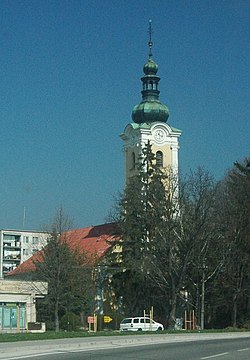Stará Turá
Stará Turá | |
|---|---|
Town | |
 The catholic church of the Assumption of the Virgin Mary in Stará Turá | |
 Coat of arms | |
 Stará Turá Location of Stará Turá in the Trenčín Region | |
| Coordinates: 48°46′36″N 17°41′46″E / 48.77667°N 17.69611°ECoordinates: 48°46′36″N 17°41′46″E / 48.77667°N 17.69611°E | |
| Country | Slovakia |
| Region | Trenčín |
| District | Nové Mesto nad Váhom |
| First mentioned | 1392 |
| Area | |
| • Total | 50.942 km2 (19.669 sq mi) |
| Elevation | 279 m (915 ft) |
| Population (2018-12-31[1]) | |
| • Total | 8,832 |
| • Density | 170/km2 (450/sq mi) |
| Time zone | CET (UTC+1) |
| • Summer (DST) | CEST (UTC+2) |
| Postal code | 916 01 |
| Area code(s) | +421-32 |
| Car plate | NM |
| Website | www.staratura.sk |
Stará Turá (German: Alt-Turn, Hungarian: Ótura) is a town in the Trenčín Region in western Slovakia.
Geography[]
It is located in the Myjava Hills close to the Little Carpathians as well as the White Carpathians. It is situated 11 km (6.84 mi) from Nové Mesto nad Váhom to the west, 12 km (7.46 mi) from Myjava to the east and around 99 km (61.52 mi) from Bratislava to the north and has a population of 8,832 (2018) with an area of 50,942 km2 (19,668.82 sq mi).
History[]
The first written record about Stará Turá was in 1392, as a village belonging to the Čachtice Castle. It was part of it until feudalism ceased to exist in the .
In 1467, Matthias Corvinus promoted Stará Turá to the servile town (oppidum), boosting the town's economy. In 1848, the town was nearly destroyed by fire.
It is mentioned in the popular folk song Teče Voda, Teče.
Demographics[]
According to the 2001 census, the town had 10,291 inhabitants. 97.4% of inhabitants were Slovaks, 1.7% Czechs and 0.2% Roma.[2] The religious make-up was 45.5% Lutherans, 27.3% Roman Catholics and 23.6% people with no religious affiliation.[2]
Famous people[]
- Viliam Vagač (*1909 – † 1970), SDB, Roman Catholic priest and religious prisoner (sentenced to 18 years in prison).[3]
Twin towns — sister cities[]
Stará Turá is twinned with:[4]
 Kunovice, Czech Republic
Kunovice, Czech Republic
References[]
- ^ "Population and migration". Statistical Office of the Slovak Republic. Retrieved 2019-04-16.
- ^ Jump up to: a b "Municipal Statistics". Statistical Office of the Slovak republic. Archived from the original on 2007-11-16. Retrieved 2007-12-09.
- ^ KUBANOVIČ, Zlatko: Historický náhľad do dejín slovenských saleziánov (Od dona Bosca do roku 1924). Bratislava : Don Bosco, 2019. ISBN 978-80-8074-436-6. S. 283 – 284.
- ^ "Úvodná strana". staratura.sk (in Slovak). Stará Turá. Retrieved 2019-09-04.
External links[]
![]() Media related to Stará Turá at Wikimedia Commons
Media related to Stará Turá at Wikimedia Commons
- Cities and towns in Slovakia
- Trenčín geography stubs

